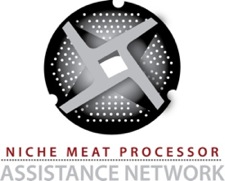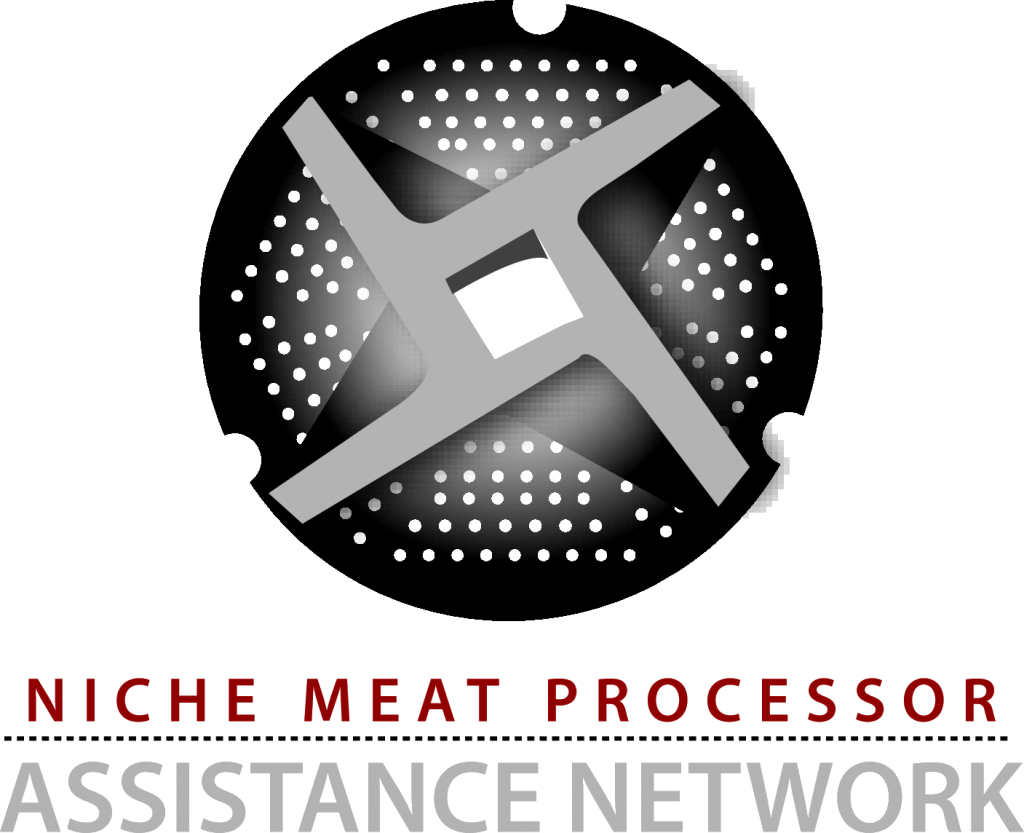What’s NMPAN?
***visit our website at nichemeatprocessing.org***
The Niche Meat Processor Assistance Network (NMPAN) is a national network of people and organizations providing technical assistance and other support to small to mid-sized meat processors and the livestock producers and niche meat buyers who depend on them.
Small and mid-sized plants—when available at all—can lack capacity, equipment, appropriate inspection status, and the human and financial capital to upgrade or expand. Around the country, people are trying to solve this problem. In the fall of 2007, we started introducing ourselves to each other.
Our goal is to strengthen and expand processing capacity, nation-wide, for niche meats – broadly defined and including locally grown, certified organic, grass-fed, naturally raised, and certified humane – in order to promote rural development and agricultural opportunities.
NMPAN is supported in part by grants from USDA Rural Development, the W.K. Kellogg Foundation, and Heifer International.
How Does NMPAN Work?
NMPAN works at two levels:
- 1. We bring together people who work with niche processors, to share resources and ideas and collaborate on issues of national importance.
- 2. We help processors, producers, buyers and others find help in their state or region.
We network with each other via the web (interactive maps, resource database, webinars) and over the phone (teleconferences, direct assistance).
Meet Our Leadership Team
(alphabetically by name)
Joseph Cordray, Iowa
Dr. Joseph Cordray is the Extension meat specialist at Iowa State University (ISU) and has over 40 years experience in all facets of the meat industry. He is responsible for the ISU series of sausage and processed meat short courses. He works extensively with Iowa meat processors on food safety training and regulatory compliance.
jcordray@iastate.edu (515) 294-4266
Jennifer Curtis, North Carolina
Jennifer Curtis is the project director of NC Choices, a Center for Environmental Farming Systems (CEFS) initiative utilizing a farm-to-fork approach to enhance sustainable animal agriculture, pasture-based production systems, small-scale, decentralized meat processing, and consumer access to local, healthy food choices. (CEFS is a partnership of North Carolina State University, North Carolina Agricultural and Technical University, and the North Carolina Department of Agriculture).
jennifer@ncchoices.com (919) 967-0014
Catherine Cutter, Pennsylvania
Dr. Catherine Cutter is an associate professor in the Department of Food Science and Food Safety Extension Specialist in muscle foods at Pennsylvania State University. She works with small processors in the northeast U.S. and co-leads a national project on food safety outreach to small and very small plants.
cnc3@psu.edu (814) 865-8862
Bruce Dunlop, Washington
Bruce Dunlop is a livestock producer and member of Island Grown Farmers Cooperative, built the first mobile USDA-inspected red-meat abattoir and has consulted on many others. Previously, he was a chemical engineer in the bio-ag and food industries.
bruce@lopezislandfarm.com (360) 468-4620
Anne Fanatico, Arkansas
Dr. Anne Fanatico has led the poultry program for 15 years at the National Center for Appropriate Technology (NCAT), a nonprofit organization that operates ATTRA, the National Sustainable Agriculture Information Service. She has developed farmer-friendly material on alternative poultry production, including free-range and organic poultry, and processing information for small and mid-size establishments. She now has a 2-year position with the USDA Agriculture Research Service to conduct research on small flocks, specialty, and organic poultry.
afanati@uark.edu (479) 575-2391
Lauren Gwin, Oregon
Dr. Lauren Gwin is research and extension faculty in the Department of Agricultural and Resource Economics at Oregon State University. She works with Oregon’s small meat processors and the livestock producers and local/niche markets that depend on them. She also coordinates a state-wide working group convened by the state department of agriculture to find solutions to the state’s processing-related challenges.
Lauren.Gwin@oregonstate.edu (541) 737-1569
Keith Payne, Washington, DC
Keith Payne is a senior staff member in the Office of Outreach, Employee Education and Training, in the Food Safety and Inspection Service of the U.S. Department of Agriculture.
Keith.Payne@fsis.usda.gov (202) 690-6522
Pam Saunders, Wisconsin
Pam Saunders is the operations and quality manager for Organic Prairie, the meat subsidiary and brand of CROPP Cooperative/ Organic Valley, which is the largest organic farmer cooperative in the US. Organic Prairie manages relationships with about a dozen certified organic co-packers for beef, pork, chicken, and turkey processing, from harvest to ready-to-eat branded products.
pam.saunders@organicvalley.com (608) 625-2666 ext.3260
Jeff Schahczenski, Montana
Jeff Schahczenski is a program specialist with the National Center for Appropriate Technology. He is an agricultural economist and has expertise in the economics and marketing of organic and grass-finished beef.
jeffs@ncat.org (406) 494-4572
Ralph Stafko, Washington, DC
Ralph Stafko is director of the Office of Outreach, Employee Education and Training, in the Food Safety and Inspection Service of the U.S. Department of Agriculture.
ralph.stafko@fsis.usda.gov (202) 418-8897
Arion Thiboumery, Iowa
Arion Thiboumery, NMPAN Co-coordinator, works for Iowa State University Extension in Rural Development and Meat Science. In Iowa, he works regularly with small meat processors and coordinates the state-wide Small Meat Processors Working Group, which brings together many Iowa assistance providers and associations to support small meat processors and diversified agriculture.
arion@iastate.edu (515)294-2882
NMPAN State Affiliates
Presently, NMPAN has State Affiliates in more than 30 states, but we’re aiming for all 50.
Click here for the NMPAN map
Affiliates are employed by university extension, state departments of agriculture, or similar organizations, and regularly work with small meat processors. They can provide state-specific answers, hands-on help, and connections to small meat processors in that state. Each state page also lists contact information for state meat processor trade associations and other state non-profits assisting small meat processors.



